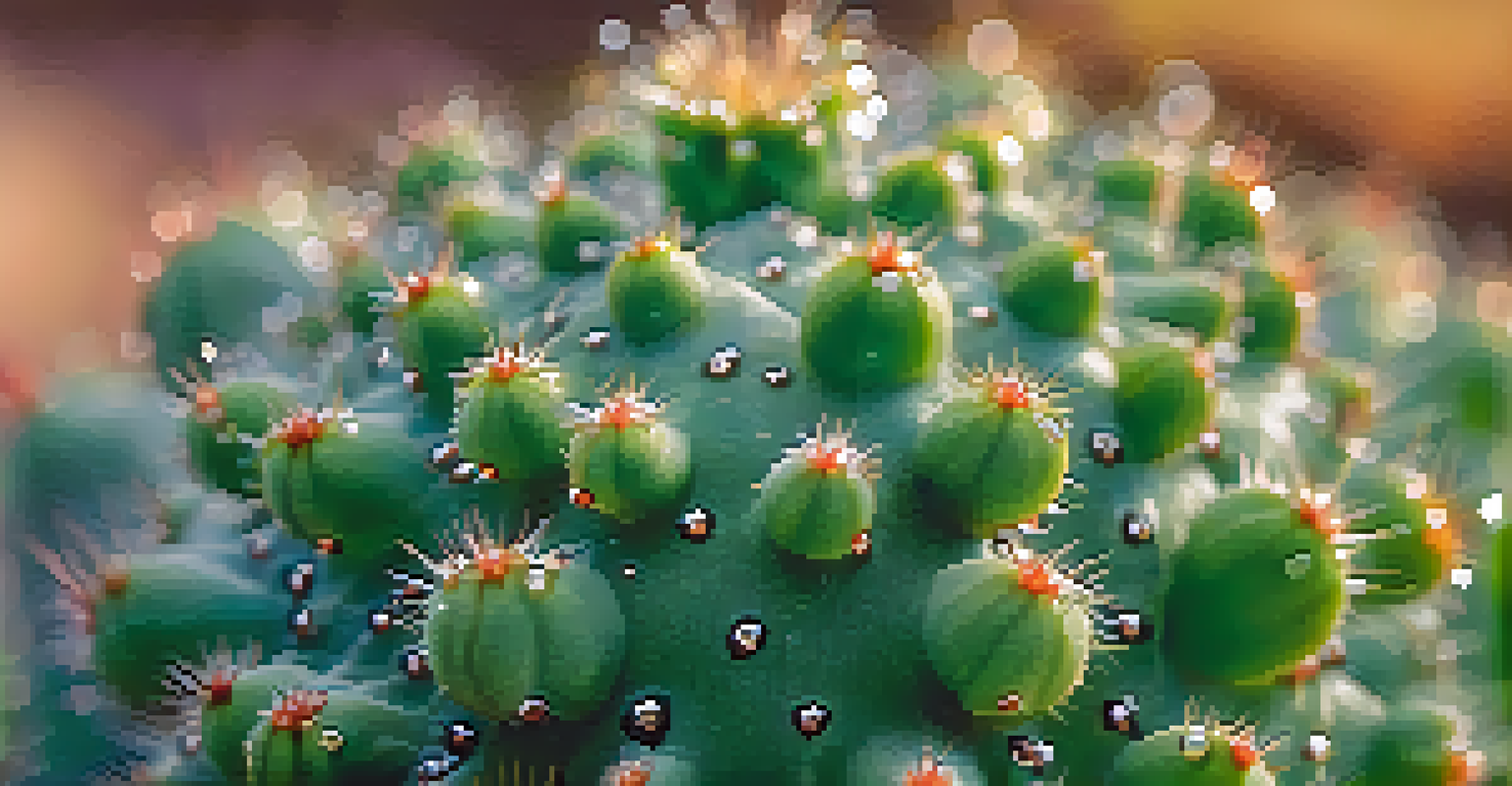Commercialization of Peyote: Ethical Concerns Discussed

Understanding Peyote and Its Cultural Significance
Peyote, a small cactus native to Mexico and the southwestern United States, has been used for thousands of years by Indigenous peoples in spiritual rituals. This sacred plant contains mescaline, a psychoactive compound that induces profound spiritual experiences. For many Indigenous cultures, Peyote is not just a plant but a vital part of their identity and religious practices.
Cultural appropriation is the taking, and thus the devaluation, of cultural elements from a marginalized culture by a more dominant one.
The cultural significance of Peyote is immense, serving as a connector to ancestral traditions and community bonding. However, this deep-rooted connection raises questions when Peyote enters the marketplace, often stripped of its spiritual context. As commercialization increases, it is crucial to consider who benefits from the sale of such a culturally important substance.
Understanding the cultural backdrop of Peyote helps frame the ethical concerns that arise when discussing its commercialization. The potential for exploitation becomes evident when we realize that making a profit from a sacred plant can lead to cultural appropriation and disrespect towards Indigenous traditions.
The Rise of Peyote in Commercial Markets
In recent years, there's been a noticeable surge in the popularity of Peyote, particularly among those seeking alternative medicine and spiritual experiences. Companies are now marketing Peyote-related products, such as capsules and extracts, making it more accessible to the general public. This trend raises alarms about the sustainability of Peyote populations, which are already threatened due to overharvesting and habitat loss.

As demand grows, the risk of commodifying a sacred substance increases, often overshadowing the very cultural roots it stems from. The commercialization of Peyote can lead to a disconnect from its traditional uses and teachings, reducing it to just another product on the shelf. This not only affects the plant's availability but also undermines its importance to Indigenous cultures.
Peyote's Cultural Significance
Peyote is a sacred plant for Indigenous peoples, deeply intertwined with their identity and spiritual practices.
Thus, the rise of Peyote in commercial markets prompts an essential dialogue about ethical sourcing and the responsibilities of businesses. Companies venturing into this space must navigate the fine line between meeting consumer demand and respecting Indigenous rights and traditions.
Ethical Implications of Commercialization
The ethical implications of Peyote commercialization are multifaceted, involving issues of cultural appropriation, sustainability, and profit-sharing. Many Indigenous communities feel that their sacred traditions are being exploited for profit, raising questions about who has the right to sell and use Peyote. This exploitation can lead to a sense of betrayal among Indigenous peoples, who often see their beliefs commodified.
The earth is what we all have in common.
Moreover, the environmental impact of commercializing Peyote cannot be overlooked. Overharvesting can deplete natural populations, jeopardizing the plant’s future and the ecosystems that rely on it. Ethical considerations must include sustainable practices that protect both the plant and its cultural significance.
Profit-sharing is another crucial aspect of this conversation. It raises the question of whether Indigenous communities should receive compensation for the commercialization of Peyote, as they are the original custodians of this sacred plant. Fair trade practices could help ensure that the benefits of commercialization are shared equitably.
Cultural Appropriation vs. Appreciation
Cultural appropriation occurs when elements of one culture are taken by another, often without understanding or respect for their significance. In the case of Peyote, many non-Indigenous users may engage with the plant without acknowledging its deep-rooted spiritual context. This can lead to a superficial understanding of Peyote, reducing a complex tradition to a mere trend.
On the other hand, cultural appreciation involves honoring and respecting the traditions of a culture while seeking to understand its significance. For non-Indigenous individuals interested in Peyote, this means engaging with Indigenous communities, learning about their practices, and recognizing the importance of the plant beyond its psychoactive properties.
Commercialization Raises Ethical Issues
The rise of Peyote in commercial markets poses risks of cultural appropriation and exploitation of Indigenous traditions.
Navigating the line between appropriation and appreciation is vital in the conversation surrounding Peyote. It calls for a respectful dialogue that honors Indigenous knowledge and practices, ensuring that any commercialization effort is done thoughtfully and ethically.
Legal Landscape Surrounding Peyote Use
The legal status of Peyote in the United States is complicated, primarily due to its classification as a Schedule I controlled substance. However, certain Indigenous groups are permitted to use Peyote in religious ceremonies under the American Indian Religious Freedom Act. This legal distinction creates a unique scenario where Indigenous peoples can legally use Peyote while its commercialization remains largely restricted.
As the conversation around Peyote evolves, there are calls to reassess its legal status, especially in light of increased interest in psychedelic substances for therapeutic use. Advocates argue that a re-evaluation could lead to greater access for those who could benefit from Peyote, while still respecting Indigenous traditions.
However, any changes to legal frameworks must prioritize Indigenous rights and ensure that they are not further marginalized in the process. It’s a delicate balance that requires careful consideration of ethical implications and respect for cultural heritage.
Sustainable Practices in Peyote Harvesting
Sustainable harvesting practices are essential to ensure that Peyote remains available for future generations. This involves implementing measures to prevent overharvesting and promoting the growth of Peyote populations. By adopting responsible harvesting techniques, we can protect the environment while still allowing for a respectful relationship with the plant.
Many Indigenous communities have long-standing practices that promote sustainability, which can serve as a model for commercial efforts. These practices include rotating harvest sites and allowing plants to regenerate fully before harvesting again. By learning from these traditions, businesses can contribute to the preservation of Peyote rather than its depletion.
Importance of Sustainable Practices
Sustainable harvesting methods are essential to protect Peyote populations and honor the cultural significance of the plant.
Ultimately, fostering sustainability in Peyote harvesting requires collaboration between Indigenous groups and commercial enterprises. This partnership can help create a framework that respects cultural significance while promoting environmental stewardship.
The Path Forward: Ethical Considerations
As the commercialization of Peyote continues to unfold, it’s crucial to prioritize ethical considerations in every aspect. Businesses venturing into this space should engage with Indigenous communities, ensuring that their voices are heard and respected. Ethical considerations should also extend to environmental practices, ensuring that the natural habitats of Peyote are preserved.
Moreover, educating consumers about the cultural significance of Peyote can help foster a deeper appreciation rather than a superficial engagement. This education can empower consumers to make informed choices, promoting products that honor Indigenous traditions and sustainable practices.

Ultimately, the path forward involves a collaborative effort that respects cultural heritage while navigating the complex landscape of commercialization. By prioritizing ethics, we can create a future where Peyote is appreciated for its spiritual significance and protected for generations to come.